Strap in and put your helmet on as I continue to ask myself, “Well Carlos, did you?”
Fun fact, from 2003 to 2015, I have no memories of reading any books at all. This means that I have a pretty good record of most, if not all the books I’ve read in the past ~20 years.
Is it a fun fact?
Or is it a sad fact?
New this year, because until 2020 I was only doing it sporadically, is making notes along the way. The plan is to review and rewrite these later into my thoughts, sometimes that might be on the book’s subject matters, sometimes it won’t be.
The reading order matters to me because there are a few things I consciously keep in mind when reading a book:
- I read to expand my mind and learn
- I make notes along the way, which I later review and rewrite
- I don’t repeat a subject back-to-back
- I cross-examine the lessons from one book with another
- I read at least 3 books on the same subject
- lived experiences influence the perspective each author has, so representation matters
Let’s stay on that last point for a little longer because since I’m reading to expand my mind and learn, those perspectives must be broader than mine. Otherwise, what experiences am I actually letting myself be shaped by?
Before we review how I did let’s take a moment to guess how I’ll do. You can guess how I did as well if you’d like.
I think I’ve done okay but I don’t think it will be enough.
Let’s find out.
Since we’ve established that I have a pretty comprehensive record of what I’ve read in the last 20 years— by not reading—let’s start by measuring the change over time.
Concealing my ignorance in aggregates
This year, I read 46 books in total.
Of those books, 27 authors were people of colour and white women. 19 authors were white men.
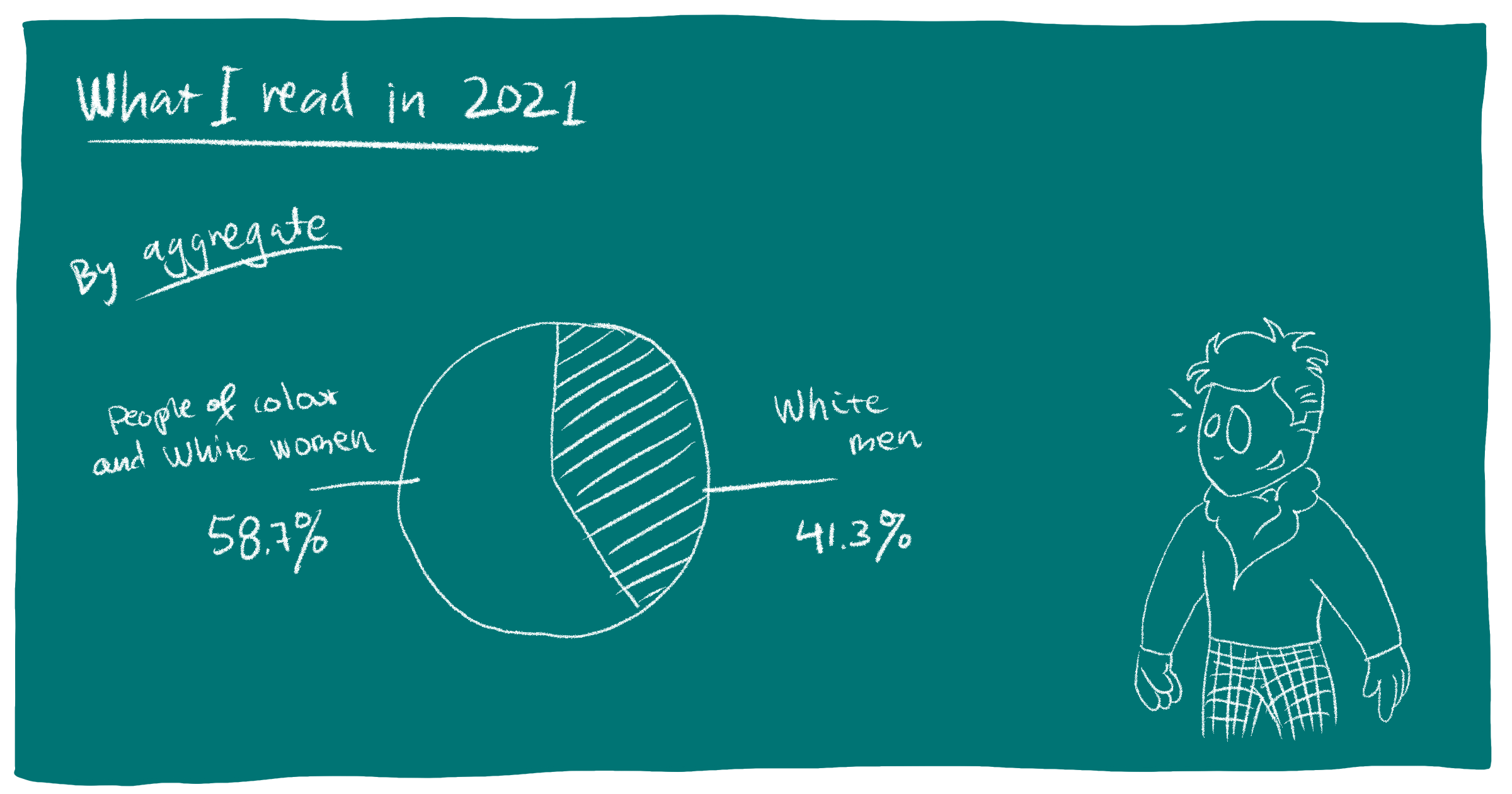
So from 2019, through 2020 to 2021, that’s changed from 33% to 63%, to settling on 59% this year. A slight drop from last year but then I only read 8 books in 2020 so there are fewer data points to draw from.
Well done Carlos, you’ve done it, you’ve solved racism!
Or have I?
If we take a moment to reflect, “white men” is actually a very narrow demographic group whilst “people of colour and white women” is incredibly broad and meant to encompass any non-white, non-men.
It’s better than “women and people of colour” but not by much.
Taking a cue from the Self-Defined dictionary’s entry and its subsequent suggestion of finding ways to reframe why this dynamic exists, let’s do that.
So, you haven’t quite solved racism, Carlos. Instead, you’ve used a very binary grouping mechanism to inform your reading habits, but why?
I don’t know.
Maybe, because it’s easy and allows me to maintain a certain level of comfortable ignorance. I can wave my hands to say, “Look I’m trying,” without actually trying that much.
It lets me continue to look at the world through this rather immature lens, where given certain conditions, I could have achieved a 100% by not reading from any white male authors and still not have read from any authors of colour.
Instead of doing the much harder work of researching each author to understand who they are, and what those lived experiences actually might be.
Let’s change that.
Okay.
First, let’s frame the problem:
Literature is overrepresented by white male authors from Europe or North America.
This means, everyone else is underrepresented and through this, they are made invisible, obscured.
So, let’s make them more visible, let’s reveal what was once concealed in aggregates.
I am jury-rigging the research from Dr Moya Bailey and Dr Izetta Autumn Mobley and their Work in the Intersections: A Black Feminist Disability Framework to give myself a scaffolding through which I can hold myself accountable.
This lets me look at my reading habits through the lenses of disability, race, and gender.
There are many other ways we define people but I’m restricted by what is publically available as I gather information from the authors themselves, either via Twitter profiles or personal websites.
It feels like using these ways of defining people to inspect my ignorance is problematic in itself but to be honest, I don’t currently know how else to hold myself accountable.
Right, let’s find out how broad my reading habits really are when we displace the abled, white man as the norm.
Let’s “well actually” myself.
Disaggregated by Disability
I’m defining Disability as the barriers society places on people with impairments, whether that’s physical, cognitive or both.
Of the 46 books I read this year, 42 books were actually from ablebodied and neurotypical authors.
Well done Carlos, we’re off to a great start, aren’t we?
Of the 4 remaining books, 2 were from Disabled authors and 2 were from Autistic authors.
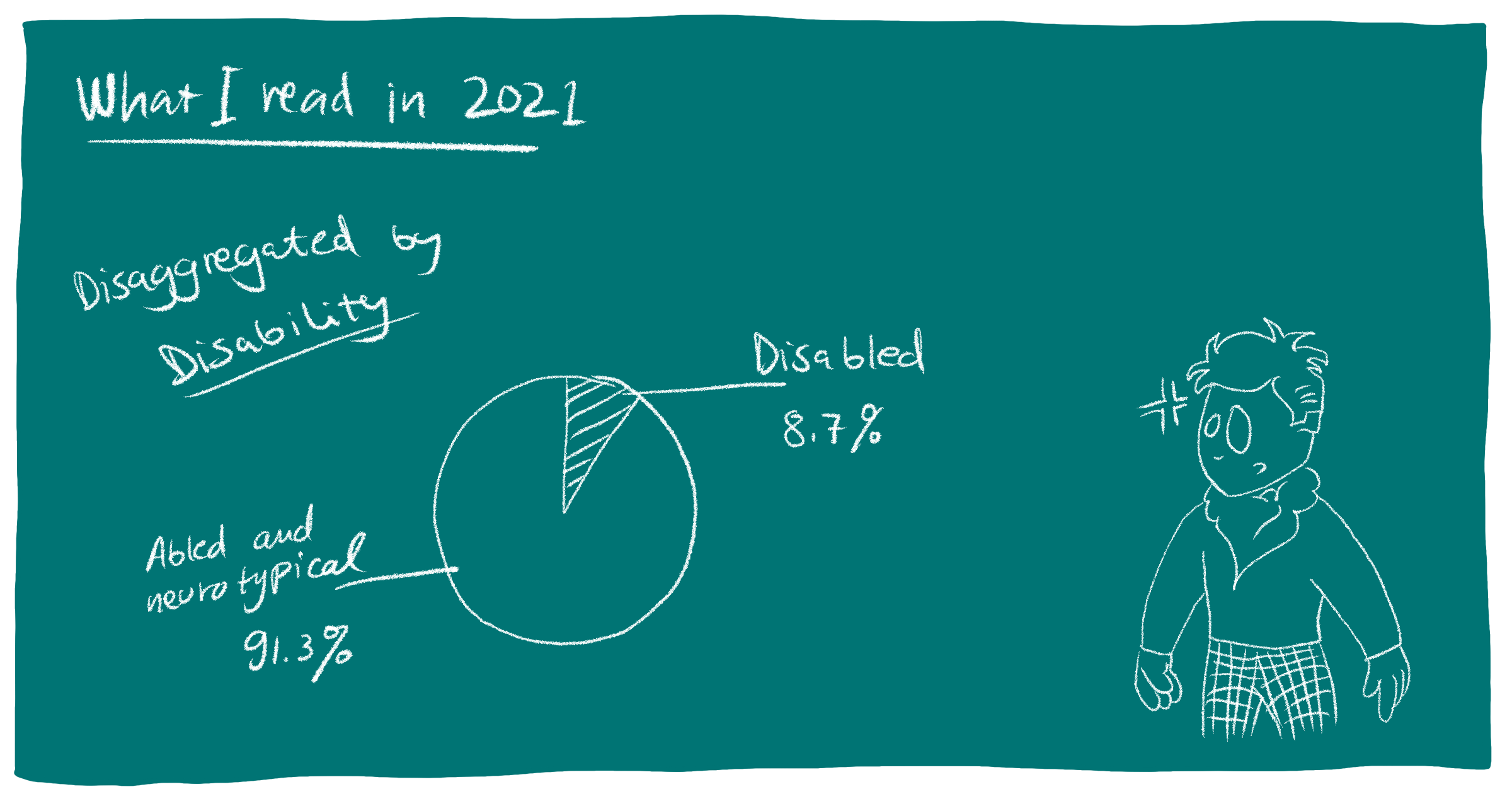
When viewed through the lens of Disability, we can see that Disabled people only actually accounted for 8.7% of my reading habits this year.
I’m quite disappointed in this and myself and I need to work on reading from more Disabled authors.
Disaggregated by race
I’m defining race as the pseudoscientific construct we use to withhold access, privileges, and power from some whilst granting more of it to others based sometimes on skin colour.
Of the 46 books I read this year, 32 books were actually from White1 authors.
Well done Carlos, you’ve done it, you’ve solved racism!
Of the 14 remaining books from authors of colour, 2 were from Black authors.
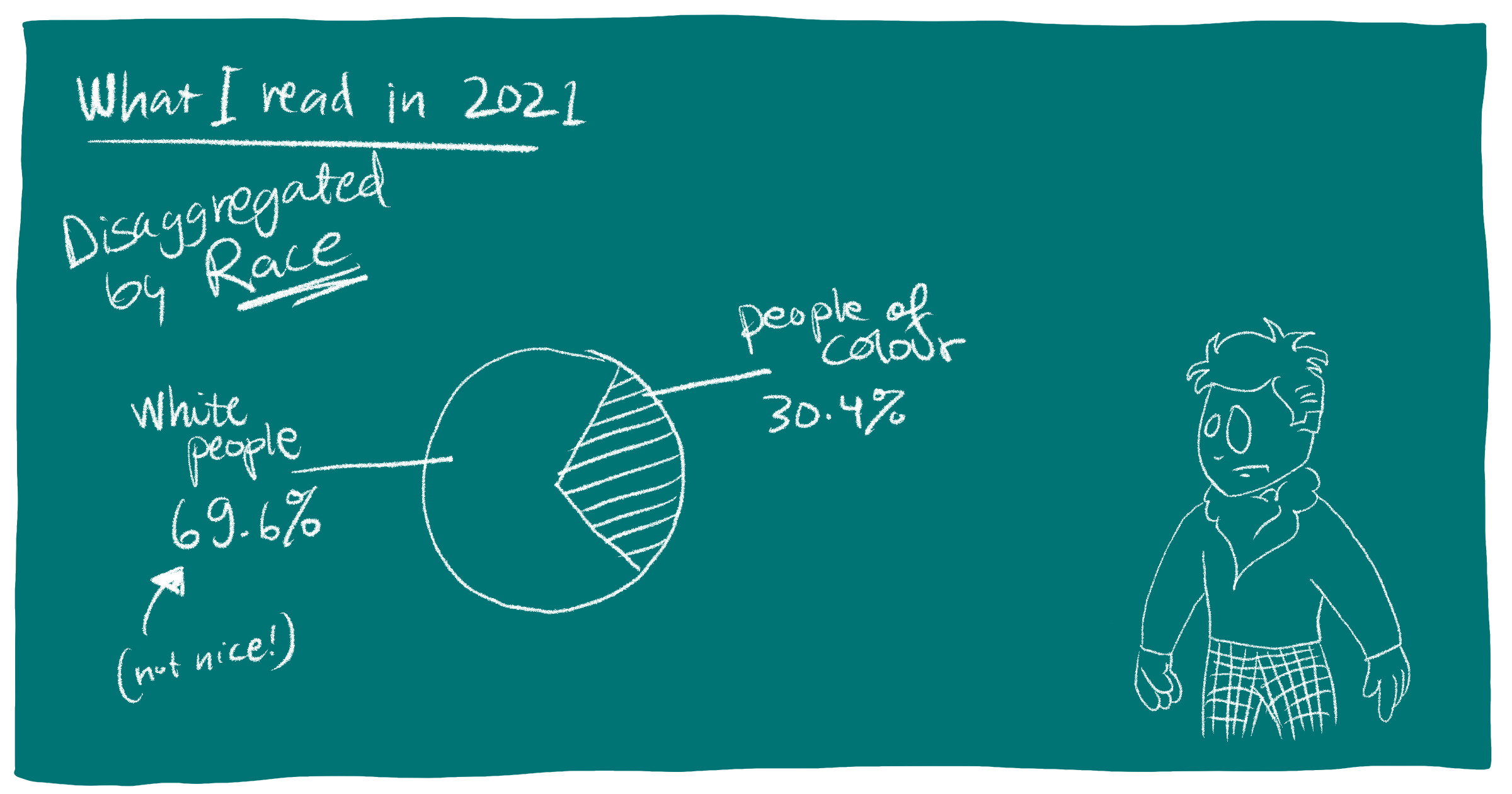
When viewed through the lens of race, we can see that people of colour only actually accounted for 30.4% of my reading habits this year.
With 12 authors, White women alone accounted for almost half in the “people of colour and white women” grouping.
This, more than anything, highlights how the power of concealing multiple identities into a single aggregate allows my ignorance to remain mostly unchallenged.
30.4% is still a decent effort though and worth celebrating but I will need to continue the work of reading from more authors of colour.
Disaggregated by gender
I’m defining gender as the constructed norms and behaviours we expect from people based on the sex we assign them at birth.
Of the 46 books I read this year, 24 books were actually from male authors.
Well done Carlos, you’ve done it, you’ve solved misogyny!
Of the 22 remaining books, 20 books were from female authors and 2 books from non-binary authors.
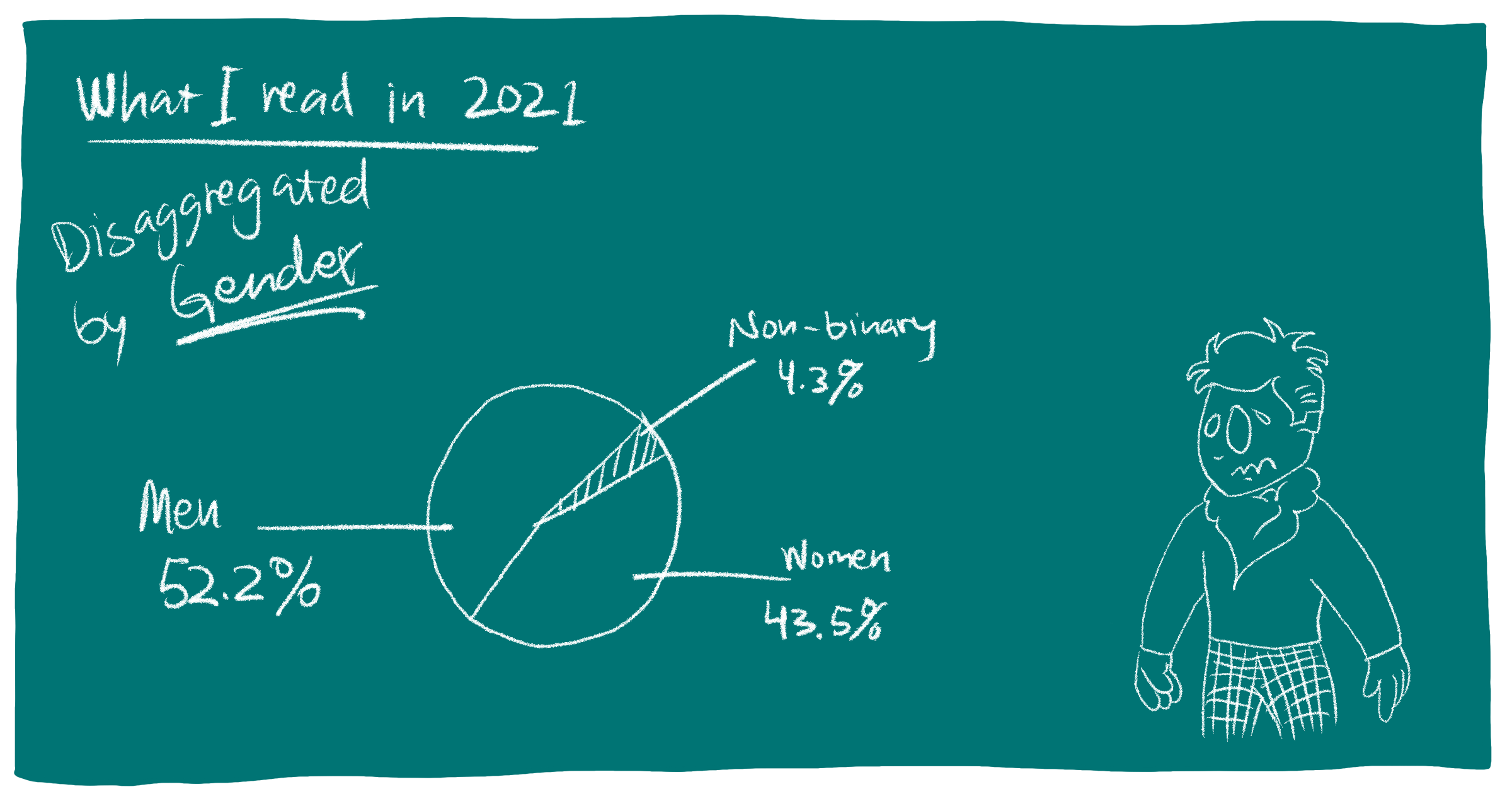
When viewed through the lens of gender, we can see that women and non-binary authors accounted for 47.8% of my reading habits this year.
Not terrible, actually.
I will, however, need to work more on my representation of non-binary and trans authors—especially in the light of anti-trans activism from people such as J.K. Rowling.
Disaggregated by nationality
I’m defining nationality as the status of belonging to a particular set of geographic boundaries.
Of the 46 books I read this year, 39 books were from European or North American authors.
Of these 39, 34 were exclusively from British or US authors.
Well done Carlos, you’ve done it, you’ve solved nationalism!
Of the 7 remaining books, 4 books were from multiethnic authors.
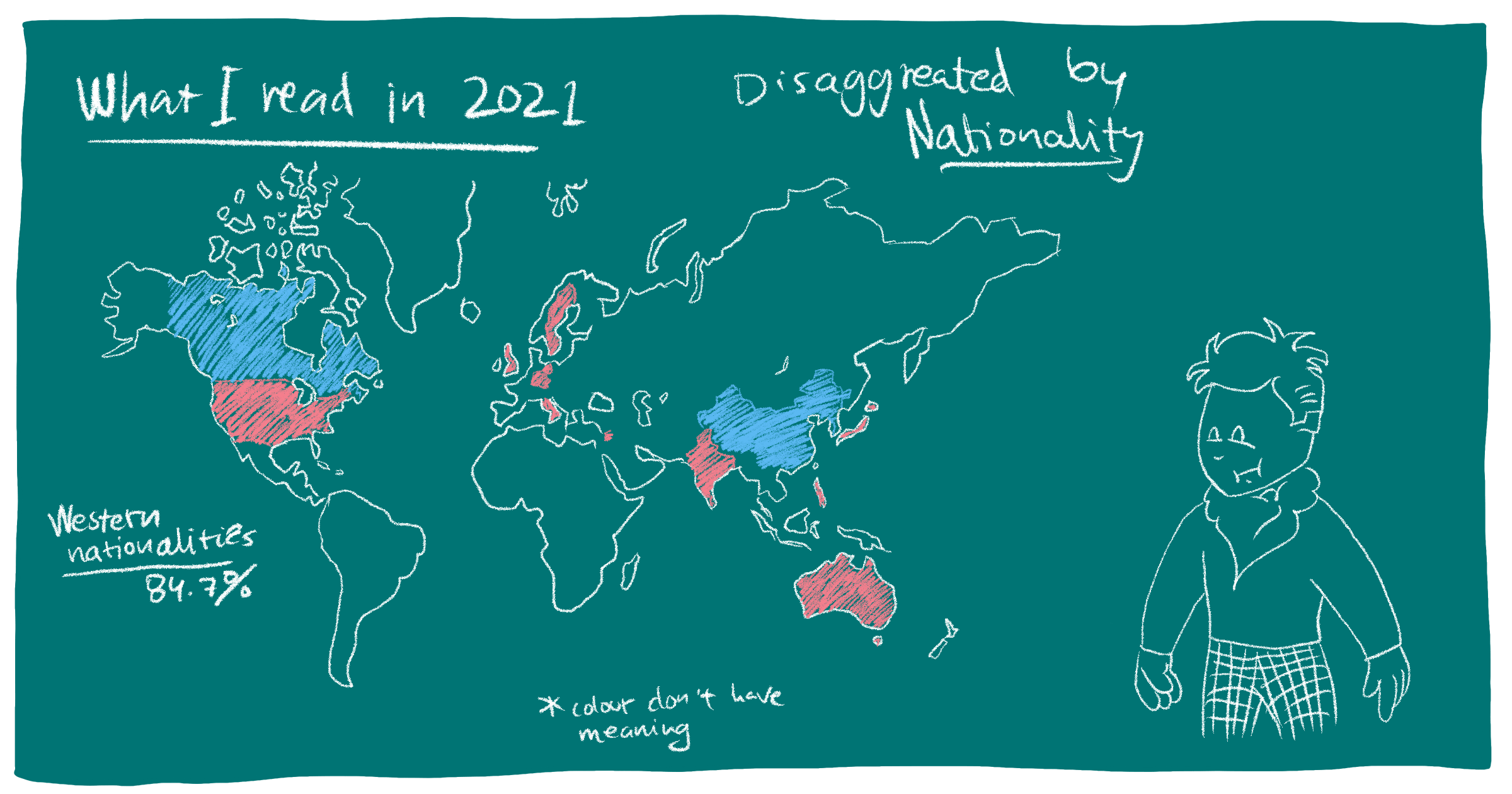
When viewed through the lens of nationality, it’s very clear how Euro-American my perspective is with only 15.3% of authors being from somewhere else this year.
This isn’t surprising considering I’m European myself.
But considering there are about 2002 countries across 7 continents in the world, it’s a shame that I’m mostly reading from only 2 of those countries.
So this is another large area of ignorance I can work on addressing.
Conclusions
So, I have read 46 books this year, but well actually, of those:
- Disabled authors accounted for 8.7%
- authors of colour accounted for 30.4%
- women and non-binary authors accounted for 47.8%
- non-Western authors accounted for 15.3%
This all sounds very disappointing, doesn’t it?
But actually actually, for a guy who grew up in a hamlet of 200 people in rural Finland, it’s not terrible.
And given that, “literature is overrepresented by white male authors from Europe or North America,” means the source of authors is also biased.
I simply need to develop mechanisms to balance this in favour of a more nuanced reading habit from these and other underrepresented authors.
Whilst recognising that my starting point is that of ignorance.
I’m not giving myself a goal, because that will give me the illusion that I decide diversity can be reached, and when it’s been reached.

Instead, I will continue with the direction of more representation.
And trusting the research from Dr Moya Bailey and Dr Izetta Autumn Mobley to act as a scaffolding.
I will also continue to learn and understand if this framework and its demographic groupings are meaningful ways of holding myself accountable because they might not be.
Perfect is the enemy of good.
I won’t strive for perfection but rather for, “more representation than yesterday,” as I continue to expand my mind and learn.
Have you read anything this year? Did anything in particular stick with you?
The National Association of Black Journalists recommends that the “w” in white be capitalised. ↩
I’m including Taiwan, Tibet, The Cook Islands, Niue, and Scotland in the list. ↩